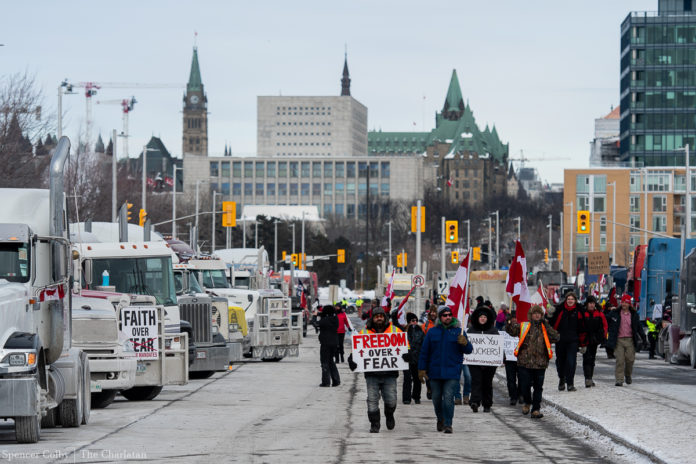
The federal government’s Public Order Emergency Commission has been investigating the invocation of the Emergencies Act in response to the Freedom Convoy in February 2022. After about a year, commissioner Paul Rouleau will release the final report no later than Feb. 20 compiling his findings.
The Aquinian’s news editor, Giuliana Grillo de Lambarri, sat down with St. Thomas University political science professor Thomas Bateman about the context of the report and what to possibly expect from it.
What is the Emergency Act?
Bateman said the federal government passed the War Measures Act in 1914 that allowed Parliament to draft and mobilize military personnel, redistribute resources and arrest without habeas corpus — the legal term for protection against unjustified and unlimited imprisonment.
“War is almost by definition an emergency. Sometimes these extreme circumstances require extraordinary responses beyond what the political system normally can produce,” he said.
The act was invoked during both World Wars and the October Crisis, a critical moment during the ‘70s when Quebec’s Front de Libération du Québec (FLQ) kidnapped a British diplomat and killed a Quebec minister of immigration and labour.
“At the time, the invocation of the War Measures Act was very popular, [but] a minority of people were very concerned about … the limitation on civil liberties that the War Measures Act permitted the government to do,” said Bateman.
He explained when The Canadian Charter of Rights and Freedoms passed in 1982, politicians in Ottawa thought it was time to update the statute to conform to the entrenched charter.
The War Measures Act was replaced in 1988 by the Emergencies Act, which requires an investigation to justify its use for accountability purposes.
“The rights on the charter aren’t absolute, but any limitation on rights has to be justifiable and justified in a court of law when a law is challenged,” said Bateman.
Invocation in 2022
The Trudeau government invoked the Emergencies Act for the first time in its history on Feb. 14, 2022, calling the truckers’ convoy a “public order emergency.“
Hundreds of truckers and supporters poured onto the streets of downtown Ottawa calling on the federal government to lift COVID-19 health guidelines for truckers driving between the U.S. and Canada.
Related: ‘That’s journalism, baby’: STU grad responds to online hate
The Emergencies Act allowed the government to freeze funds from truckers’ and supporters’ personal and corporate accounts and also gave officials the power to remove vehicles used in the blockades.
Inquiry and final report
Governor General Mary Simon revoked Trudeau’s declaration of a public order emergency on Feb. 23, 2022. On April 25, Ontario Court of Appeal Justice Rouleau was appointed as commissioner of the Public Order Emergency Commission (POEC).
The commission collected documents, testimonies and evidence from the events at the Freedom Convoy to assess the invocation of the Emergencies Act.
Bateman said the commission’s purpose is not to take a moral stand on the usage of the act, but rather investigate the situation and weigh civil liberties against government power.
“Liberal democratic citizenship requires people to forbear and put up with a lot of inconveniences,” he said. “This is the dynamic at the heart of this inquiry.”
Bateman said the inquiry itself had key speakers such as Prime Minister Justin Trudeau, whom he said was “the man of the hour.”
“He acquitted himself fairly well and perhaps performed above expectations. He knew a lot of details and he was pretty expansive in his answers to questions,” he said.
Bateman expects the report will favourably regard the government’s actions but might leave a low bar for the future usage of the act.
“The concern is that the movement goes from true, national emergencies, which everybody regards as such, to more partisan, ideologically-charged events that will tempt certain governments in certain circumstances to invoke the Emergencies Act,” he said.
